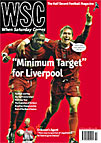 Dundee and Darlington have gone into administration after making enemies with their own ambition. Times are still tough for Cambridge United but the supporters trust is now the largest shareholder, as Tom Davies writes
Dundee and Darlington have gone into administration after making enemies with their own ambition. Times are still tough for Cambridge United but the supporters trust is now the largest shareholder, as Tom Davies writes
Any football supporters who still need reminding of the perils of roguish, “flamboyant” investors making big promises need only study recent developments at Dundee and Darlington.
The Scottish Premier League club went into administration in December a few months after the arrival in the boardroom of Giovanni Di Stefano, who had promised the kind of investment that could have lifted Dundee ahead of the pack in the SPL (see WSC 200). Six months on, they are in the bottom two, £20 million in debt and were forced to offload their most valuable players. The arrival of Di Stefano, whose connections to such cuddly figures as Saddam Hussein and Slobodan Milosevic have given Dundee a certain dubious high profile, has turned out to be something of an irrelevant cracks-papering exercise. The club had been spending way beyond their means for several years and while Di Stefano subsidised the brief recent Dens Park careers of Fabrizio Ravanelli and Craig Burley, more concrete funding has not been forthcoming and none of this addressed the underlying financial problems.
These can be traced to the decision, four seasons ago, to gamble on a policy of bringing in, and selling on at a profit, relatively glamorous overseas players. This only really worked in the case of Claudio Caniggia and the club found themselves saddled instead with a number of highly paid players on long contracts who became a burden as the transfer market collapsed.
Fans have been critical of Dundee’s owners, James and Peter Marr, for not moving to stem the losses earlier and are now engaged in the familiar round of bucket-passing and fundraising to help dig the club out of the mess. In an interesting twist on the nursery club debate, the owners of Lithuanian side FC Kaunas are among the potential interested buyers. The consortium is headed up by financier Vladimir Romanov, who claims Dundee would serve as a handy shop window for Lithuanian players. Di Stefano, meanwhile, has formed a skeletal club called Dundee City, which he says he intends to use to buy up Dens Park and keep professional football going there should Dundee be liquidated. Fans find his motives no easier to discern, however.
Following Dundee into administration on December 24, with debts thought to be up to £250,000, were Darlington, less than five months after the club moved to the 27,000-capacity Reynolds Arena. Supporters had long worried that building such a large stadium for a struggling Third Division club (even, mostly, at the chairman’s own personal expense) would backfire and it would appear that their worst fears have come true.
The whole position is not helped by the low standing of chairman George Reynolds, whose threatening behaviour towards critical supporters has been well documented (see WSC 194) and who fans now generally want to see the back of. “The stadium was too ambitious,” says supporters’ trust spokesman Steve Duffy, “and whether through bad luck or mismanagement the club is now in a bit of a state.”
At the time of writing the administrator is still sifting through the financial mess. The players are reported to have been unpaid for some time and the repayment of a £2m loan taken out by the club for the stadium project is a cause of concern. The high running costs of the Reynolds Arena could also leave an expensive legacy to any future owners. Reynolds has complained that council restrictions prevent him from fully utilising the stadium site for non-footballing events such as car boot sales and pop concerts, but the chairman signed up to those conditions himself in his desperation to secure planning permission.
The stadium has attracted new fans, but nowhere near enough and, with the coffers empty and the team facing an uphill struggle to stay in the League, it’s hard to see how the break-even crowd figure of 6-6,500 is to be regularly reached. The club’s former ground, Feethams, is still standing and some have floated the idea of returning there, though with many of its fixtures and fittings removed, that too would be costly.
Slightly happier news at Cambridge United , where the result of an anxious autumn’s battle against debt has been the impending appointment of a supporter representative to the club’s board of directors. The Us, another club who had over-reached themselves before the ITV Digital collapse, had been faced with the possible loss of control of their own stadium and destiny had an outstanding year-old £600,000 loan from a finance house not been repaid by December 22. (The Abbey Stadium itself was used to secure the loan.) Directors’ contributions and rescheduled loans accounted for £500,000 of the amount needed, but a frantic and dedicated supporters effort, co-ordinated by the Cambridge Fans United trust, secured the rest and helped keep the wolves from the door for the time being. As a result, the trust, now the largest shareholder, has been offered an elected seat on the board. In the meantime, of course, the squad has undergone drastic pruning and times remain tough.
From WSC 204 February 2004. What was happening this month